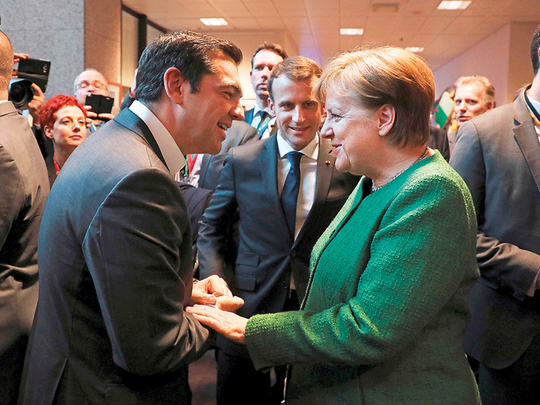
GENEVA, BRUSSELS, BEIJING: The World Trade Organization chief warned on Friday that creating barriers to international trade would “jeopardise the global economy,” after Washington slapped steep tariffs on Chinese imports, heightening fears of a trade war.
“Disrupting trade flows will jeopardise the global economy at a time when economic recovery, though fragile, has been increasingly evident around the world,” WTO Director-General Roberto Azevedo said in a statement, calling for “restraint and urgent dialogue”.
Meanwhile French leader Emmanuel Macron said on Friday Europe would not negotiate trade deals with a gun to the head. European Union leaders demanded a permanent EU exclusion from US President Donald Trump’s metal-import tariffs and kept alive a threat to retaliate, highlighting persistent risks of a trans-Atlantic trade war.
Citing national security, Trump on Friday imposed duties of 25 per cent on steel and 10 per cent on aluminium while granting a five-week waiver to the EU, Canada, Mexico, Brazil, Argentina, Australia and South Korea. An exclusion for those countries beyond May 1 will depend on the status of “discussions of satisfactory long-term alternative means to address the threatened impairment to US national security,” the White House said.
The EU’s heads of government responded with a sharply-worded statement expressing “regrets” that Trump imposed the metal tariffs at all, saying the measures fail to address the root problem of overcapacity and insisting Europe has already offered the US “full cooperation” to help re-balance the global market.
“These measures cannot be justified on the grounds of national security, and sector-wide protection in the US is an inappropriate remedy for the real problems of overcapacity,” the bloc’s 28 national leaders said in the statement released on Friday in Brussels.
The EU has spent the past several weeks scrambling for a waiver from the US metal tariffs while warning that a failure to gain one would lead to a tit-for-tat response on 2.8 billion euros (Dh12.7 billion) of imports of US goods including Harley-Davidson Inc. motorcycles, Levi Strauss & Co. jeans and bourbon whiskey.
The EU also said that, without an exemption, it would file a complaint to the World Trade Organization against the Trump administration and introduce “safeguard” actions to prevent metal shipments from other parts of the world to America from being diverted to the European market and flooding it. China announced it would complain to the WTO after failing to win any exclusion from the US metal levies.
The statement by EU leaders “takes note that shipments of steel and aluminium from the European Union have been temporarily exempted from such measures, and calls for that exemption to be made permanent.” It also cites the EU’s right “to respond to the US measures as appropriate and in a proportionate manner.”
China retaliation
Beijing announcing its first retaliation against metals levies hours after President Donald Trump outlined fresh tariffs on $50 billion of Chinese imports and pledged there’s more on the way.
On Friday, China unveiled tariffs on $3 billion of US imports in response to steel and aluminium duties ordered by Trump earlier this month. The White House then declared a temporary exemption for the European Union and other nations on those levies, making the focus on China clear. Though Beijing’s actions so far are seen by analysts as measured, there may be more to come.
China’s ambassador to the US wouldn’t rule out the possibility of the Asian nation scaling back purchases of Treasuries in response to tariffs imposed by President Donald Trump.
“We are looking at all options,” Ambassador Cui Tiankai told Bloomberg Television, when asked whether China would consider reduced purchases of US Treasuries. “That’s why we believe any unilateral and protectionist move would hurt everybody, including the United States itself. It would certainly hurt the daily life of American middle-class people, and the American companies, and the financial markets.”
China is America’s biggest foreign creditor. It held $1.17 trillion in Treasuries as of January, or about 19 per cent of all foreign holdings of US government securities.












